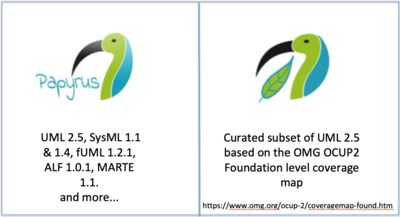Notice: this Wiki will be going read only early in 2024 and edits will no longer be possible. Please see: https://gitlab.eclipse.org/eclipsefdn/helpdesk/-/wikis/Wiki-shutdown-plan for the plan.
Getting Started with Papyrus UMLLight
Revision as of 12:13, 26 April 2019 by Charles.zeligsoft.com (Talk | contribs) (→Comparing Papyrus amd Papyrus UMLLight: Adding image)
Getting Started with Papyrus UMLLight
Contents
Introduction
As part of this tutorial, the trainee will:
- Learn how to download and install Papyrus UMLLight.
- Become familiar with the various aspects of the modeling environment such as workspaces, menus, views, perspectives and palettes.
- Become familiar with the elements that make up the“Papyrus UMLLight” subset.
- Through the implementation of a sample modeling project, become familiar with a simple model development approach that will enable you to use the elements that are part of the Papyrus UMLLight subset.
At the end of the training, the trainee will be able to apply their acquired knowledge in real project.
What _are_ Papyrus and Papyrus UMLLight
What is Papyrus
- * A complete open Source editor that Conform to UML, SysML, and other Object Management Group (OMG) standards
- * [An Eclipse Project [1]
- A familly of modeling tools
- Papyrus itself (both tool and platform) ("Papyrus")
- * Papyrus for information modeling ("Papyrus-IM")
- * Papyrus for Real-time ("Papyrus-RT")
- * and now Papyrus UMLLight
- * [Supported by the Papyrus Industry Consortium, a community of developers, committers and contributors from many organizations and involved in different application domains.


